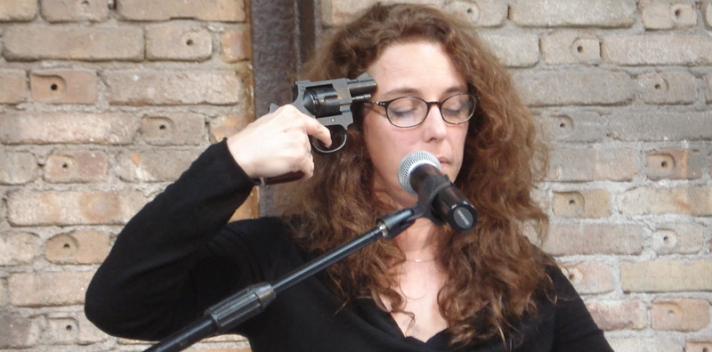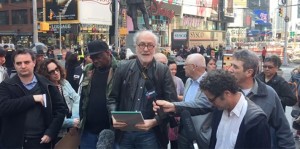
EspañolOn Monday, April 13, amid the Castro brothers’ dictatorship being given greater logistical and rhetorical support across the Americas, cities around the world joined in solidarity with the Cuban pro-democracy cause. This show of support was embodied in Cuban performance artist Tania Bruguera, the latest hostage of the ailing revolutionary regime.
Right in the middle of New York’s Times Square, and in the museums, galleries, and public spaces of San Francisco, Chicago, Rome, and Amsterdam, among other cities, dozens of artists, activists, students, critics, and art curators demonstrated peacefully against the restriction of basic personal freedoms on the Caribbean island.
It was a remake of “Tatlin’s Whisper #6“, an “arte útil” installation by Bruguera. After unveiling it during the 10th Havana Biennial Festival in March 2009, she was nearly expelled from the island, and denied entry to Cuba for several years after leaving to live in New York.
Bruguera attempted to revisit the Whisper on December 30, 2014, in Havana’s Plaza of the Revolution, but the state had apparently become even more repressive in the intervening five years: she was shut down by the police, and arrested along with participating members of the public.
As a result, the internationally renowned artist is facing a judicial process in Cuba, and has suffered countless interrogations by the political police. In a bid to prevent her from spreading her message abroad, the regime has invalidated her passport.
She was unable to return to her New York apartment, where I once had the privilege to meet her in person and listen to the dreams of this 46-year-old artist whose enthusiasm remains as strong as ever.

The renowned Hans Haacke, Pablo Helguera, Nikki Columbus, Paul Ramírez Jonas, Ahmet Ögüt, Dread Scott, Claire Bishop, Roselee Goldberg (the founder of Performa), and even the commissioner of cultural affairs in New York, Tom Finkelpearl, attended and took part in the global performance on Monday.
The event was coordinated by Creative Time and its director, Anne Pasternak, with the support of Ai Weiwei, Cuauhtémoc Medina, the Museum of Modern Art (MoMA), and the Guggenheim, among other leading personalities and institutions in contemporary art.
But in “Tatlin’s Whisper #6,” everyone is equal, regardless whether they belong to the social elite or are just another person on the subway. The performance returns a voice to those whose voice has been stolen: participants are given one minute, and one minute only, to express themselves via megaphone or microphone in an open forum. In short, the public are given a chance to exercise their inalienable right to free expression.
It’s a very simple artistic idea. And that’s why it’s so explosive. Because in the supposedly egalitarian Cuba, under brutal state repression, equality is the only thing that is not tolerated.
That is why Bruguera is still imprisoned on the island, with no knowledge of what charges will be presented against her (although causing a “public scandal” is likely), when her trial date will be, or if a local lawyer will take the risk to defend her case.
It’s a wearily depressing set up under Cuban communism: the victim is set up, presented with false charges, and proven guilty in a show trial that’s a mockery even to those who still believe in the Castro brothers.
In the supposedly egalitarian Cuba, under brutal state repression, equality is the only thing that is not tolerated.
Bruguera, without bowing down to the mighty, still defines herself as a leftist. But her beliefs are distinct to the apolitical totalitarianism that rules her country and several others in the region, although it goes by the various names of Castroism, Chavismo, or Bolivarianismo.
As Oswaldo Payá said in the years before he was assassinated by the Cuban government on July 22, 2012, there is no distinguishing between left-wing or right-wing dictatorships; they are simply dictatorships. Because rights have no political color, or race, or culture. Because human dignity is an inalienable gift beyond the market and the state.
Social networks — not only in Cuba — are currently overflowing with the hashtags #YoTambienExijo (I Also Demand) and #UnDiaParaCuba (One Day for Cuba). As the rebellious blogger Claudia Cadelo put it back in 2009, when “Tatlin’s Whisper #6” was held in Havana, the hope is that sooner or later “freedom of expression will cease to be only a performance in our country.”
Translated by Rebeca Morla. Edited by Laurie Blair.
 Versión Español
Versión Español












